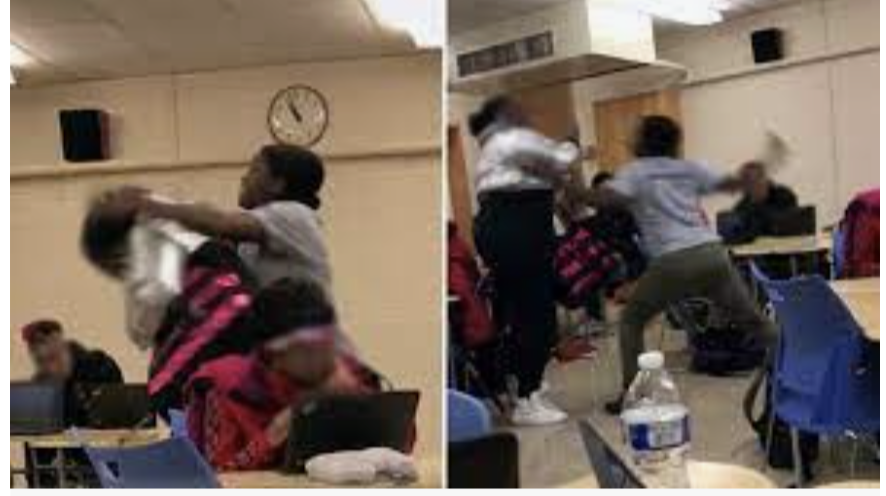"Stop doing that, or else we'll ask you again!" Chaos in schools as discipline is cancelled
/stem class?
“Disparate impact”, don’t you know. Too bad for the kids who are there trying to learn.
A progressive push to soften school discipline has caused student suspensions to plummet — and made city classrooms more chaotic and dangerous than ever, parents and teachers charge.
Suspensions of five days or more meted out by principals and superintendents plunged more than 42 percent from the fall of 2017 to the fall of 2021, from 14,502 to 8,369, Department of Education data shows.
As suspensions declined, taxpayer money allocated to “restorative justice” — a system that sends badly-behaving students to mediation, conflict “circle” meetings, and guidance counseling, rather than boot them from classrooms — soared. The city in February pledged to sink $1.3 million more into such programs.
“That’s the reason everything’s in the toilet,” one Queens educator, who asked to remain anonymous, told The Post. “They were saying people of color were disproportionately affected by suspension, but to completely take [suspensions] away from everybody in every instance is doing more harm than good.”
Black and Hispanic kids are suspended more often than their peers, according to a 2021 report, and some advocates have cheered the drop in kicking kids out.
But fewer suspensions mean more mayhem in the classroom, according to educators and parents.
“We have teachers getting kicked at, spit at, cursed at, things thrown at [them] and the kid is back the next day like nothing happened,” said the teacher, who didn’t give her name for fear of retaliation. “And the teacher is asked, ‘What did you do to trigger the child?'”
Everyone is so concerned with the rights of the two or three upstarts in the room, that the other 30 kids — their rights to get an education … to be able to sit in an environment that’s not intimidating, that’s not scary, that’s not filled with noise” don’t matter, said [Queens teacher Kathy] Perez, a reading specialist who won a $125,000 legal settlement from the city after she was hurt by out-of-control teens in class. “No one has ever had an answer to that.”
There’s nothing new here: I’ve written about the subject for years, but here’s a Hartford Current article from 2019 reporting on black parents demanding that teachers and administrators stop disciplining students. Apparently, living in a motel lowers one’s hopes and ambitions for your children.
Hartford public school teachers troubled by the district’s shift away from traditional discipline were lectured themselves this month when they brought their concerns to a recent school board meeting.
Several parents and community members at the April 16 meeting bristled at the claims that students “rove the halls,” disrupt class and disrespect teachers without consequence, an apparent side effect of the district’s emphasis on restorative practices over punitive actions. Instead, parents argued, the teachers must be at a loss to deal with students who don’t look like them.
Tensions came to a head when one attendee, who was black, said Hartford needs “more of our own kind in our schools and to teach these teachers who don’t know.” The man also used a derogatory epithet against teacher and union vice president Jay Gutierrez, who spoke up in his members’ defense.
“You look just like Uncle Tom anyway, so be quiet,” the man told Guiterrez. “This is my time. This is my time. Shut up, Uncle Tom."
The school district has been working to reduce school suspensions through a “restorative justice” model since 2015, when then-Superintendent Beth Schiavino-Narvaez included the direction in her strategic plan. Torres-Rodriguez has expanded that approach since taking over in 2017, based on the idea that a heavy-handed, suspension-heavy approach further alienates students in impoverished, urban areas.
“Restorative practice is about making sure you take an opportunity to look at repairing the harm that was done to all involved, meaning up to and including the entire school community, and it begins to address the underlying problems that may have led to the offense in the first place,” Torres-Rodriguez said Friday.
But most of the discussion centered around discipline, after Hartford Federation of Teachers President Andrea Johnson and others argued unacceptable behavior is going uncorrected.
They referenced students biting, kicking, scratching and throwing objects at educators; using profanities and ignoring dress codes; and making teachers feel unsafe in their own classrooms and halls. ….
“They have no fear of consequences because, frankly, there are none,” the teacher said. “So here we are trying to force common core standards down the throats of the disinterested.” ….
“When you violate a policy, you have a consequence that goes with it, and that is just not happening in Hartford,” Johnson said. “We’re not saying that kids are bad. We have the best kids in the state of Connecticut. We love our kids. But at the same time, there needs to be some sort of order, and students have to follow that order so they can learn.”
But hope is on the way!
Nearly a quarter of Hartford teachers were nonwhite this year, virtually unchanged from recent years, but the district has made great strides in recruiting.
Teachers of color represented about 40 percent of new hires for 2018-2019, up from 22.5 percent of new hires in 2015-2016. People of color also represent 46 percent of certified administrators, up from 41.4 percent last year, and 75 percent of the superintendent’s cabinet, up from 50 percent last year.
The district also began rolling out trauma sensitivity and equity training three years ago, adding a cohort of five to six schools each year.


